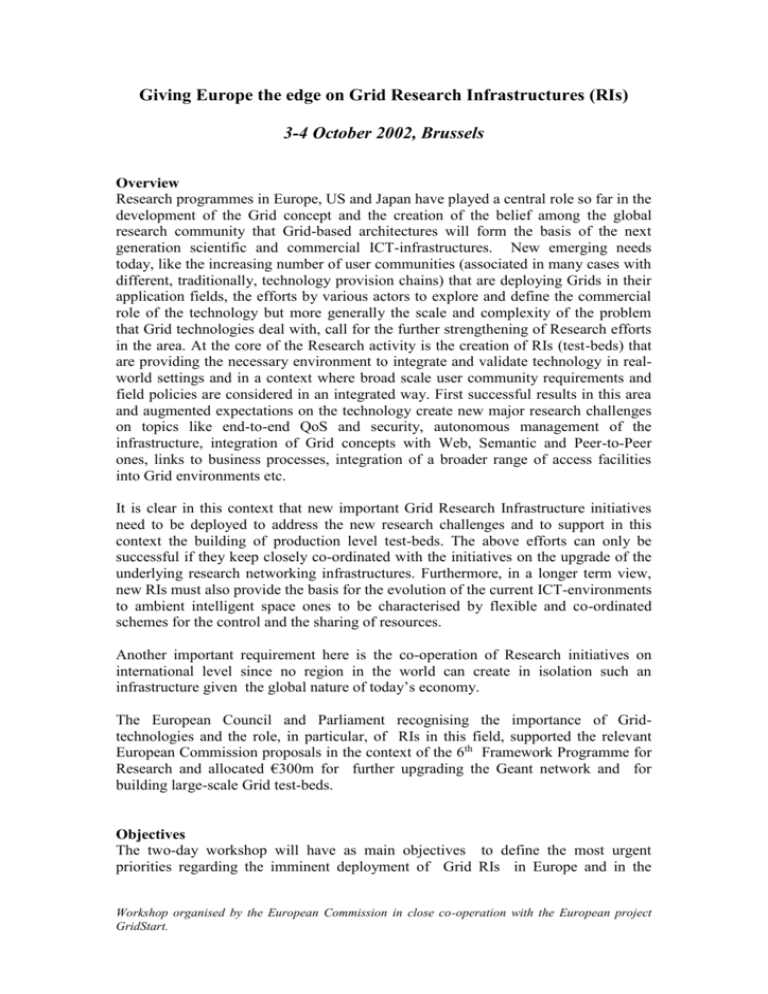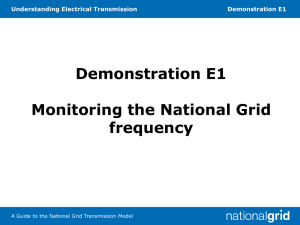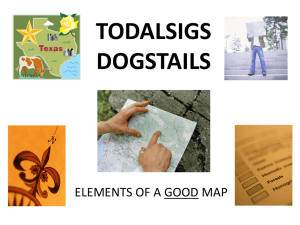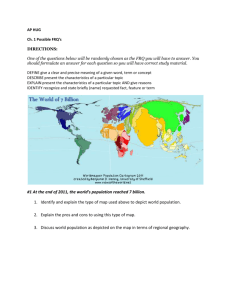Giving Europe the edge in Research
advertisement

Giving Europe the edge on Grid Research Infrastructures (RIs) 3-4 October 2002, Brussels Overview Research programmes in Europe, US and Japan have played a central role so far in the development of the Grid concept and the creation of the belief among the global research community that Grid-based architectures will form the basis of the next generation scientific and commercial ICT-infrastructures. New emerging needs today, like the increasing number of user communities (associated in many cases with different, traditionally, technology provision chains) that are deploying Grids in their application fields, the efforts by various actors to explore and define the commercial role of the technology but more generally the scale and complexity of the problem that Grid technologies deal with, call for the further strengthening of Research efforts in the area. At the core of the Research activity is the creation of RIs (test-beds) that are providing the necessary environment to integrate and validate technology in realworld settings and in a context where broad scale user community requirements and field policies are considered in an integrated way. First successful results in this area and augmented expectations on the technology create new major research challenges on topics like end-to-end QoS and security, autonomous management of the infrastructure, integration of Grid concepts with Web, Semantic and Peer-to-Peer ones, links to business processes, integration of a broader range of access facilities into Grid environments etc. It is clear in this context that new important Grid Research Infrastructure initiatives need to be deployed to address the new research challenges and to support in this context the building of production level test-beds. The above efforts can only be successful if they keep closely co-ordinated with the initiatives on the upgrade of the underlying research networking infrastructures. Furthermore, in a longer term view, new RIs must also provide the basis for the evolution of the current ICT-environments to ambient intelligent space ones to be characterised by flexible and co-ordinated schemes for the control and the sharing of resources. Another important requirement here is the co-operation of Research initiatives on international level since no region in the world can create in isolation such an infrastructure given the global nature of today’s economy. The European Council and Parliament recognising the importance of Gridtechnologies and the role, in particular, of RIs in this field, supported the relevant European Commission proposals in the context of the 6th Framework Programme for Research and allocated €300m for further upgrading the Geant network and for building large-scale Grid test-beds. Objectives The two-day workshop will have as main objectives to define the most urgent priorities regarding the imminent deployment of Grid RIs in Europe and in the Workshop organised by the European Commission in close co-operation with the European project GridStart. world, as well as to achieve a broader community consensus for the creation and use of these infrastructures. This should be done in the context of a broader discussion on how the future Grid infrastructure must look like. A (non-exclusive) list of topics that are proposed for discussion are the following: 1) Main characteristics of the future GRID infrastructures. 2) Define the major stages/milestones of deployment of GRID RIs in Europe (as seen today). 3) A model of closer co-operation between the Grid-community on one hand and the Geant network and the NRENs on the other. 4) International co-operation: what should be the next steps regarding RIs? 5) Grid standards: what, when, who, how? 6) Define the principal actors (and their different needs) in the deployment of new GRID RIs in the following categories: avant-guard research, technology developers, technology/service providers, user groups, policy makers, sponsors, etc. 7) Define a few specific issues which are considered at the moment as major challenges for the deployment of RIs in the following categories: scientific, technological, sociological and purely practical. 8) Next challenges/steps in adopting a service model for Grids. 9) How RIs can promote a fast uptake of GRIDs by industry and for commercial use? 10) Grid computing in the broader framework of distributed computing (clustercomputing, supercomputing etc.) 11) A Distributed Terascale Facility in Europe? 12) Usage models for early key applications and their implications on design of RIs. Organisation Participation in the workshop will be by invitation only. Workshop participants are kindly requested to provide a maximum one-page summary of their views on topics related to the workshop objectives (other topics of discussion in relation to the Grid RIs area may also be proposed) by September 27 at the latest. This input should be sent by email to Kyriakos.Baxevanidis@cec.eu.int. An invited speech will be delivered by Paul Messina (Senior Computer Scientist, Argonne National Laboratory; Senior Advisor on Computing, CERN; Principal Investigator, Distributed Terascale Facility; former Director of Center for Advanced Computing Research and assistant vice-president for Scientific Computing at Caltech; Chairman of the Global Grid Forum Advisory Group; Member of the Cyberinfrastructure Panel of the NSF, USA, ) More information on the workshop will soon be published on: http://www.cordis.lu/ist/rn/home.html Workshop organised by the European Commission in close co-operation with the European project GridStart.






